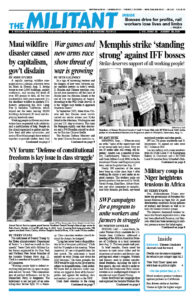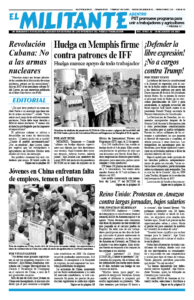The course led by Thomas Sankara in Burkina Faso is a powerful example to working people across Africa, in the U.S. and worldwide. Tens of millions confront social and economic crises, the deadly consequences of Moscow’s war in Ukraine and the threat of new wars.
Sankara led a revolution, toppling a pro-imperialist regime and replacing it with a popular revolutionary government. As president between 1983 and 1987, he used political power to organize the toiling classes to confront the results of imperialist exploitation and to transform their conditions and lives.
Burkina Faso, formerly Upper Volta, was one of the poorest countries in Africa — as Niger is today. The revolutionary government mobilized the toiling majority to fight for what they needed, to build their own mass organizations and to join with struggles worldwide against imperialist domination and capitalist exploitation. It curtailed the power of the landowners and exploiting classes. It nationalized the land to guarantee peasants the fruits of their labor.
Millions were mobilized to carry out literacy and immunization drives, and build wells, dams, schools, housing and a national railroad. They planted trees to push back the Sahara desert, whose encroachment is a challenge to peoples across the Sahel.
“As Karl Marx said, those who live in a palace do not think about the same things, nor in the same way, as those who live in a hut,” Sankara said in 1986. “The struggle to defend the trees and forest is above all a struggle against imperialism.”
From the outset his government mobilized women to fight for their emancipation. Ending women’s subjugation “is a basic necessity for the revolution to triumph,” he said.
While some political figures in Africa try to bask in the legacy of Sankara to get a hearing, there is no government in Africa today following the revolutionary course he blazed.
Like Fidel Castro, the central leader of Cuba’s socialist revolution, Sankara acted on the capacities of ordinary men and women to transform the world and themselves. He spoke on behalf of the exploited worldwide, against governments that serve the exploiters.
Sankara was assassinated in a counterrevolutionary coup to protect the interests of those whose class domination was threatened by a deep going revolution. Since then he has become a symbol for millions of workers, farmers and young people.
Pathfinder publishes Thomas Sankara Speaks, in English, Spanish and French. Read what Sankara said and help get the book into the hands of fellow workers.

